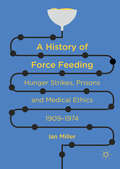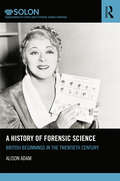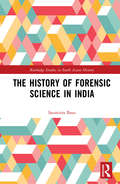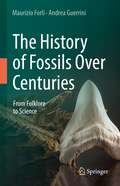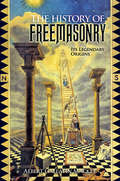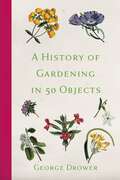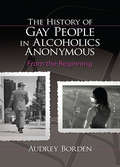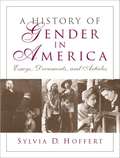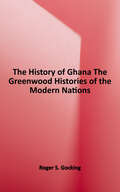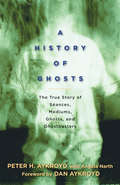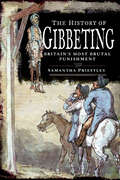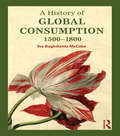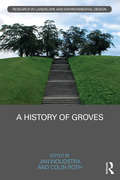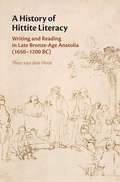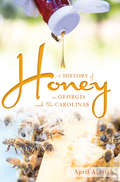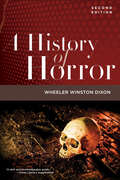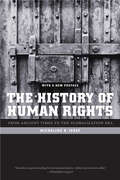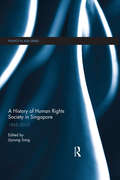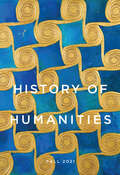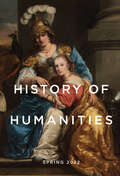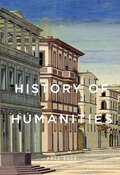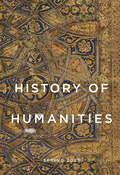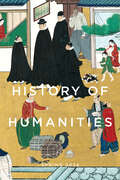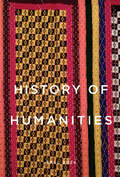- Table View
- List View
A History of Force Feeding: Hunger Strikes, Prisons and Medical Ethics, 1909–1974
by Ian MillerThis book is Open Access under a CC BY license. It is the first monograph-length study of the force-feeding of hunger strikers in English, Irish and Northern Irish prisons. It examines ethical debates that arose throughout the twentieth century when governments authorised the force-feeding of imprisoned suffragettes, Irish republicans and convict prisoners. It also explores the fraught role of prison doctors called upon to perform the procedure. Since the Home Office first authorised force-feeding in 1909, a number of questions have been raised about the procedure. Is force-feeding safe? Can it kill? Are doctors who feed prisoners against their will abandoning the medical ethical norms of their profession? And do state bodies use prison doctors to help tackle political dissidence at times of political crisis?
A History of Forensic Science: British beginnings in the twentieth century (Routledge SOLON Explorations in Crime and Criminal Justice Histories)
by Alison AdamHow and when did forensic science originate in the UK? This question demands our attention because our understanding of present-day forensic science is vastly enriched through gaining an appreciation of what went before. A History of Forensic Science is the first book to consider the wide spectrum of influences which went into creating the discipline in Britain in the first part of the twentieth century. This book offers a history of the development of forensic sciences, centred on the UK, but with consideration of continental and colonial influences, from around 1880 to approximately 1940. This period was central to the formation of a separate discipline of forensic science with a distinct professional identity and this book charts the strategies of the new forensic scientists to gain an authoritative voice in the courtroom and to forge a professional identity in the space between forensic medicine, scientific policing, and independent expert witnessing. In so doing, it improves our understanding of how forensic science developed as it did. This book is essential reading for academics and students engaged in the study of criminology, the history of forensic science, science and technology studies and the history of policing.
The History of Forensic Science in India (Routledge Studies in South Asian History)
by Saumitra BasuThis book explores the interaction between science and society and the development of forensic science as well as the historical roots of crime detection in colonial India. Covering a period from the mid-19th to mid-20th century, the author examines how British colonial rulers changed the perception of crime which prevailed in the colonial states and introduced forensic science as a measure of criminal identification in the Indian subcontinent. The book traces the historical background of the development and use of forensic science in civil and criminal investigation during the colonial period, and explores the extent to which forensic science has proven useful in investigation and trials. Connecting the historical beginning of forensic science with its socio historical context and diversity of scientific application for crime detection, this book sheds new light on the history of forensic science in colonial India. Using an interdisciplinary approach incorporating science and technology studies and history of crime detection, the book will be of interest to researchers in the fields of forensic science, criminology, science and technology studies, law, South Asian history and colonial history.
The History of Forgetting: Los Angeles and the Erasure of Memory
by Norman M. KleinIn this extraordinary and original work, Norman Klein examines the process of memory erasure in LA.
The History of Fossils Over Centuries: From Folklore to Science
by Maurizio Forli Andrea GuerriniThis book discusses the history of invertebrate fossil understanding and classification by exploring fossil studies between the 15th and 18th centuries. Before the modern age, the understanding of fossil findings went through several phases. The treatment by philologists, philosophers and historians of natural sciences involved religious, sometimes folkloristic, aspects before scientific ones. This work showcases and assesses these original findings by carrying out a bibliographical, and above all iconographical research, aimed at finding the first printed images of the objects that we now know as fossils. From here, the authors provide an understanding of the true nature of fossils by analyzing them through modern academic viewpoints, and describing each fossil group from a paleontological and taxonomic point of view, retracing their treatment in the course of the centuries.As a point of reference for each fossil group treated, the authors have considered indispensable the use of ancient prints as evidence of the first iconographic sources dedicated to fossils, starting from those in the late fifteenth century, dedicated to the most common groups of invertebrates without neglecting a necessary exception, the ichthyodontolites, fundamental in the discussion in Italy on the interpretation of the organic origin of fossils, and from the end of the sixteenth century to about half of the eighteenth century. The abundant iconographic apparatus used, often unpublished or specially reworked, is essential and functional to the understanding of the various aspects addressed, a visual complement to the text and vice versa, designed and used taking its cue from the need imposed on early scholars to document their discoveries visually. Among the chosen images there is no shortage of original attributions to fossil finds that have been poorly understood or misidentified until now.The English translation of this book from its Italian original manuscript was done with the help of artificial intelligence (machine translation by the service provider DeepL.com). A subsequent human revision of the content was done by the authors.
The History of Freemasonry: Its Legendary Origins
by Albert Gallatin MackeyAn air of profound mystery surrounds the fraternal order of Free and Accepted Masons, or Freemasons. Built on three pillars of brotherly love, charity, and truth, the order ranks among the world's oldest and most renowned societies. This classic study explores Freemasonry's history and traditions, both legendary and documented, and chronicles the society's influence on the Western world, particularly in regard to American culture and government. Author Albert Gallatin Mackey, a renowned historian of the society who held many high positions in the order, traces the rise of Freemasonry from its roots in the ages of Biblical patriarchs and ancient Rome to the eighteenth-century involvement of the Founding Fathers of the United States. He also explores the associations of the Freemasons with the Knights Templars of the Crusades, the Druids, the Rosicrucians, and a secret Muslim sect known as the Assassins. In addition, he discusses the significance of the Stone of Philosophers, Euclidean geometry, and a variety of forms of architecture. This complete survey of the mythical and allegorical narrative of Freemasonry offers novices and experts alike a revealing look at the society's philosophical and ritual foundations.
A History of Gardening in 50 Objects
by George DrowerThe earliest record of an enclosed space around a homestead come from 10,000 BC and since then gardens of varying types and ambition have been popular throughout the ages. Whether ornamental patches surrounding wild cottages, container gardens blooming over unforgiving concrete or those turned over for growing produce, gardens exist in all shapes and sizes, in all manner of styles.Today we benefit from centuries of development, be it in the cultivation of desirable blossom or larger fruits, in the technology to keep weeds and lawn at bay or even in the visionaries who tore up rulebooks and cultivated pure creativity in their green spaces.George Drower takes fifty objects that have helped create the gardening scene we know today and explores the history outside spaces in a truly unique fashion. With stunning botanical and archive images, this lavish volume is essential for garden lovers.
The History of Gay People in Alcoholics Anonymous: From the Beginning
by Audrey BordenThe History of Gay People in Alcoholics Anonymous documents and honors the ways thousands of LGBT people have carried Alcoholics Anonymous' message. This illuminating chronicle includes interviews and documents that detail the compelling history, recovery, and wisdom of gay people in AA. The book examines the challenges AA faced as the fellowship endeavored to become a more inclusive and cohesive community. The first-person accounts narrate the important work of influential gay and straight AA members that led key events in AA’s history. The author includes material on the steps and traditions of AA, and on becoming an ally to LGBT people on the road to recovery.Topics in The History of Gay People in Alcoholics Anonymous include: the gay origins of AA’s Third Tradition a comparison of treatments for alcoholism and homosexuality compelling portraits of sober gay life in the 1950s and 1960s the debate in AA over meetings for gay alcoholics interviews with members and co-founders of the first gay AA meetings the history of the first gay AA/Al-Anon conference interviews with pioneering gay addiction professionals the history of AA pamphlet “AA and the Gay/Lesbian Alcoholic” Alcoholics Together, and why a parallel AA organization for gay alcoholics formed in southern California strategies AA’s gay members developed to make their meetings simultaneously safe and public—and why some of them are still necessary today much more The History of Gay People in Alcoholics Anonymous is an enlightening book for members of the LGBT and heterosexual recovering community, alcoholism and addiction professionals, as well as physicians, counselors, psychiatrists, psychologists, social workers, clergy, historians, sociologists, educators, students, and anyone interested in learning more about AA or this aspect of the community’s history.
A History of Gender in America: Essays, Documents, and Articles
by Sylvia D. HoffertA reader for an undergraduate course assembling recent literature on the history of gender in the US, with section introductions setting the context of the period covered. A list of suggested readings replaces a bibliography. There is no index. Annotation c. Book News, Inc., Portland, OR (booknews.com)
The History of Ghana: Greenwood Histories of the Modern Nations
by Roger S. GockingGocking provides a historical overview of Ghana from the emergence of precolonial states through increasing contact with Europeans that led to the establishment of formal colonial rule by Great Britain at the end of the 19th century. Colonial rule transformed what was known as the Gold Coast economically, socially, and politically, but it contained the seeds of its own demise. After World War II an increasingly more effective nationalist movement challenged British rule, and in 1957 Ghana became independent. Independence brought its own challenges the most important of which was the inability to maintain political stability. Within the space of 24 years there were four military coups and the collapse of three republics. Ghana's Fourth Republic, established in 1993, has dealt with the legacy of instability inherited from the past as it moves towards a more stable future. A timeline, photographs, maps, and an appendix of biographies of notable figures in the history of Ghana are included. Students and adults alike will find this book to be highly effective in describing this country's often turbulent and tumultuous history.
A History of Ghosts: The True Story of Séances, Mediums, Ghosts, and Ghostbusters
by Peter H. Aykroyd Angela NarthPeter Aykroyd spent his childhood watching his family's parlor séances through the crack of a basement door. Here, for the first time, Aykroyd tells the strange and delightful story that inspired his son, Dan, to make the mega-hit, Ghostbusters. Part history, part family legend, A History of Ghosts starts in 1848 in upstate New York, where the spiritualist craze first began. Aykroyd introduces the reader to notable mediums while telling the story of the development of spiritualism, interweaving a personal history marked by a fascination with ghosts and spirits with the larger narrative about the role the paranormal has played in our culture. Such legendary figures as Sir Arthur Conan Doyle and Harry Houdini appear and vanish. Everyone loves a good ghost story. Successful TV shows such as Medium and Ghost Hunters are proof that our national obsession with ghosts is here to stay. Millions of Americans believe in the paranormal—and even skeptics have heard a bump in the night and suspected it might be something supernatural.
The History of Gibbeting: Britain's Most Brutal Punishment
by Samantha PriestleyAn eye-opening guide to the public execution practice of hanging criminals in body-shaped cages as a crime deterrent or religious punishment. The history of gibbeting is the story of one of Britain’s most brutal forms of punishments, the hanging of criminals in a body shaped metal cage as a warning and as a form of justice. From the folklore of live gibbetings to the eerie historical documenting of this weird post-execution tradition, The History of Gibbeting examines how and why we dealt with murderers and other serious criminals in this way. The book uses case studies through history and takes a look at how the introduction of the Murder Act shaped our relationship with gibbeting for years to come, and how we as a society demanded the most shocking post-mortem treatment of criminals. Whether gibbeting was ever a successful deterrent, it is still a fascination today and gibbet cages remain on display in museums all over the country.“I have to say that I was not aware that gibbeting involved metal cages, nor how society clamored for post-mortems on gibbeted victims. Absolutely fascinating, but not for the faint-hearted!” —Books Monthly
A History of Global Consumption: 1500 - 1800
by Ina Baghdiantz McCabeIn A History of Global Consumption: 1500 – 1800, Ina Baghdiantz McCabe examines the history of consumption throughout the early modern period using a combination of chronological and thematic discussion, taking a comprehensive and wide-reaching view of a subject that has long been on the historical agenda. The title explores the topic from the rise of the collector in Renaissance Europe to the birth of consumption as a political tool in the eighteenth century. Beginning with an overview of the history of consumption and the major theorists, such as Bourdieu, Elias and Barthes, who have shaped its development as a field, Baghdiantz McCabe approaches the subject through a clear chronological framework. Supplemented by illlustrations in every chapter and ranging in scope from an analysis of the success of American commodities such as tobacco, sugar and chocolate in Europe and Asia to a discussion of the Dutch tulip mania, A History of Global Consumption: 1500 – 1800 is the perfect guide for all students interested in the social, cultural and economic history of the early modern period.
A History of Groves (Routledge Research in Landscape and Environmental Design)
by Jan Woudstra Colin RothThe grove, a grouping of trees, intentionally cultivated or found growing wild, has a long diverse history entwined with human settlement, rural practices and the culture and politics of cities. A grove can be a memorial, a place of learning, a site of poetic retreat and philosophy or political encampment, a public park or theatre, a place of hidden pleasures, a symbol of a vanished forest ecology, or a place of gods or other spirits. Yet groves are largely absent from our contemporary vocabulary and rarely included in today’s landscape practice, whether urban or rural. Groves are both literal and metaphorical manifestations, ways of defining spaces and ecologies in our cultural life. Since they can add meaning to urban forms and ecologies and contribute meaningfully to the significance of place, critical examination is long overdue. The editors have taken care to ensure that the text is accessible to the general reader as well as specialists.
A History of Hittite Literacy: Writing and Reading in Late Bronze-Age Anatolia (1650–1200 BC)
by Theo van HoutWhy did the Anatolians remain illiterate for so long, although surrounded by people using script? Why and how did they eventually adopt the cuneiform writing system and why did they still invent a second, hieroglyphic script of their own? What did and didn't they write down and what role did Hittite literature, the oldest known literature in any Indo-European language, play? These and many other questions on scribal culture are addressed in this first, comprehensive book on writing, reading, script usage, and literacy in the Hittite kingdom (c.1650–1200 BC). It describes the rise and fall of literacy and literature in Hittite Anatolia in the wider context of its political, economic, and intellectual history.
A History of Honey in Georgia and the Carolinas (American Palate)
by April AldrichIn the late 1800s, Georgia and the Carolinas produced millions of pounds of honey and created a lasting legacy within the industry. The uses for the sweet nectar go well beyond flavor. Bee pollination extensively benefits agricultural crops in the area. Elements from the beehive are commonly used in popular cosmetics, medicines and mead. Beekeepers also face serious challenges like Colony Collapse Disorder. Join author and beekeeper April Aldrich as she traces the delectable history of honey and beekeeping throughout the region, from ancient apiaries to modern meaderies and beyond.
A History of Horror, 2nd Edition
by Wheeler Winston DixonEver since horror leapt from popular fiction to the silver screen in the late 1890s, viewers have experienced fear and pleasure in exquisite combination. Wheeler Winston Dixon's fully revised and updated A History of Horror is still the only book to offer a comprehensive survey of this ever-popular film genre. Arranged by decades, with outliers and franchise films overlapping some years, this one-stop sourcebook unearths the historical origins of characters such as Dracula, Frankenstein, and the Wolfman and their various incarnations in film from the silent era to comedic sequels. In covering the last decade, this new edition includes coverage of the resurgence of the genre, covering the swath of new groundbreaking horror films directed by women, Black and queer horror films, and a new international wave in body horror films. A History of Horror explores how the horror film fits into the Hollywood studio system, how the distribution and exhibition of horror films have changed in a post-COVID world, and how its enormous success in American and European culture expanded globally over time. Dixon examines key periods in the horror film-in which the basic precepts of the genre were established, then banished into conveniently reliable and malleable forms, and then, after collapsing into parody, rose again and again to create new levels of intensity and menace. A History of Horror, supported by rare stills from classic films, brings over sixty timeless horror films into frightfully clear focus, zooms in on today's top horror Web sites, and champions the stars, directors, and subgenres that make the horror film so exciting and popular with contemporary audiences.
The History of Human Rights
by Micheline IshayMicheline Ishay recounts the dramatic struggle for human rights across the ages in a book that brilliantly synthesizes historical and intellectual developments from the Mesopotamian Codes of Hammurabi to today's era of globalization. As she chronicles the clash of social movements, ideas, and armies that have played a part in this struggle, Ishay illustrates how the history of human rights has evolved from one era to the next through texts, cultural traditions, and creative expression. Writing with verve and extraordinary range, she develops a framework for understanding contemporary issues from the debate over globalization to the intervention in Kosovo to the climate for human rights after September 11, 2001. The only comprehensive history of human rights available, the book will be essential reading for anyone concerned with humankind's quest for justice and dignity. Ishay structures her chapters around six core questions that have shaped human rights debate and scholarship: What are the origins of human rights? Why did the European vision of human rights triumph over those of other civilizations? Has socialism made a lasting contribution to the legacy of human rights? Are human rights universal or culturally bound? Must human rights be sacrificed to the demands of national security? Is globalization eroding or advancing human rights? As she explores these questions, Ishay also incorporates notable documents--writings, speeches, and political statements--from activists, writers, and thinkers throughout history.
A History of Human Rights Society in Singapore: 1965-2015 (Politics in Asia)
by Jiyoung SongTo celebrate Singapore’s fiftieth anniversary for its independence from Malaysia in 2015, 35 students, academics and activists came together to discuss and write about pioneering Singaporean human rights activists and their under-reported stories in Singapore. The city-state is known for its remarkable economic success while having strict laws on individual freedom in the name of national security, public order and racial harmony. Singapore’s tough stance on human rights, however, does not negate the long and persistent existence of a human rights society that is little known to the world until today. This volume, composed of nine distinctive chapters, records a history of human rights activists, their campaigns, main contentions with the government, survival strategies and other untold stories in Singapore’s first 50 years of state-building.
History of Humanities, volume 6 number 2 (Fall 2021)
by History of HumanitiesThis is volume 6 issue 2 of History of Humanities. History of Humanities, along with the Society for the History of the Humanities, takes as its subject the history of a wide variety of disciplines including archaeology, art history, historiography, linguistics, literary studies, musicology, philology, and media studies, tracing these fields from their earliest developments, through their formalization into university disciplines, and to the modern day. By exploring the history of humanities across time and civilizations and along with their sociopolitical and epistemic implications, the journal takes a critical look at the concept of humanities itself.
History of Humanities, volume 7 number 1 (Spring 2022)
by History of HumanitiesThis is volume 7 issue 1 of History of Humanities. History of Humanities, along with the Society for the History of the Humanities, takes as its subject the history of a wide variety of disciplines including archaeology, art history, historiography, linguistics, literary studies, musicology, philology, and media studies, tracing these fields from their earliest developments, through their formalization into university disciplines, and to the modern day. By exploring the history of humanities across time and civilizations and along with their sociopolitical and epistemic implications, the journal takes a critical look at the concept of humanities itself.
History of Humanities, volume 7 number 2 (Fall 2022)
by History of HumanitiesThis is volume 7 issue 2 of History of Humanities. History of Humanities, along with the Society for the History of the Humanities, takes as its subject the history of a wide variety of disciplines including archaeology, art history, historiography, linguistics, literary studies, musicology, philology, and media studies, tracing these fields from their earliest developments, through their formalization into university disciplines, and to the modern day. By exploring the history of humanities across time and civilizations and along with their sociopolitical and epistemic implications, the journal takes a critical look at the concept of humanities itself.
History of Humanities, volume 8 number 1 (Spring 2023)
by History of HumanitiesThis is volume 8 issue 1 of History of Humanities. History of Humanities, along with the Society for the History of the Humanities, takes as its subject the history of a wide variety of disciplines including archaeology, art history, historiography, linguistics, literary studies, musicology, philology, and media studies, tracing these fields from their earliest developments, through their formalization into university disciplines, and to the modern day. By exploring the history of humanities across time and civilizations and along with their sociopolitical and epistemic implications, the journal takes a critical look at the concept of humanities itself.
History of Humanities, volume 9 number 1 (Spring 2024)
by History of HumanitiesThis is volume 9 issue 1 of History of Humanities. History of Humanities, along with the Society for the History of the Humanities, takes as its subject the history of a wide variety of disciplines including archaeology, art history, historiography, linguistics, literary studies, musicology, philology, and media studies, tracing these fields from their earliest developments, through their formalization into university disciplines, and to the modern day. By exploring the history of humanities across time and civilizations and along with their sociopolitical and epistemic implications, the journal takes a critical look at the concept of humanities itself.
History of Humanities, volume 9 number 2 (Fall 2024)
by History of HumanitiesThis is volume 9 issue 2 of History of Humanities. History of Humanities, along with the Society for the History of the Humanities, takes as its subject the history of a wide variety of disciplines including archaeology, art history, historiography, linguistics, literary studies, musicology, philology, and media studies, tracing these fields from their earliest developments, through their formalization into university disciplines, and to the modern day. By exploring the history of humanities across time and civilizations and along with their sociopolitical and epistemic implications, the journal takes a critical look at the concept of humanities itself.
